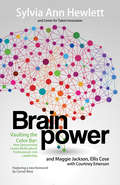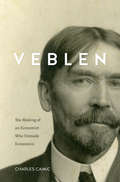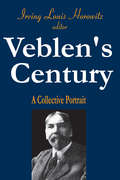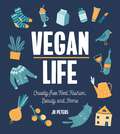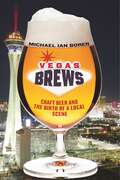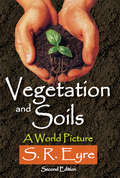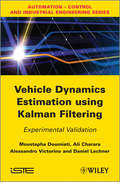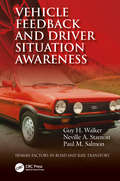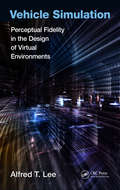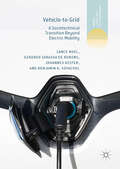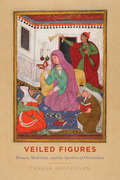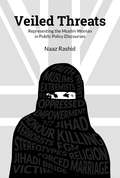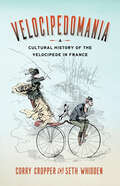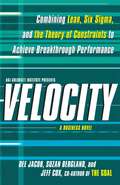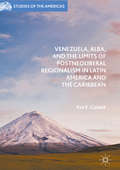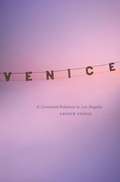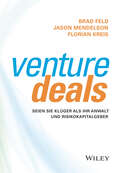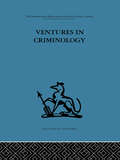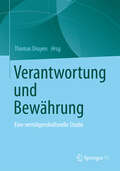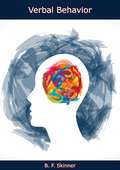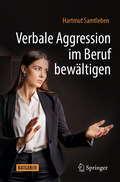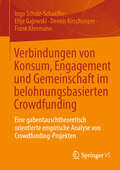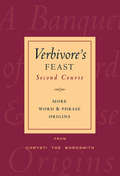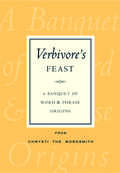- Table View
- List View
Vaulting the Color Bar
by Sylvia Ann Hewlett Maggie JacksonAn era of vibrant diversity is rewriting our culture, schools, workplaces and history. But more than a decade into the twenty-first century, talent of color are not breaking into the top executive ranks in numbers proportionate to their achievements and demographic mass. To move past lingering bias and subtle exclusion, people of color need the powerful advocacy of sponsorship. This robust relationship capital drives engagement and retention, fostering workplaces of inclusion, authenticity and innovation. Sponsorship levers talent of color and syncs progressive organizations with a rapidly diversifying world.
Veblen (Routledge Studies In The History Of Economics Ser. #115)
by Charles CamicA bold new biography of the thinker who demolished accepted economic theories in order to expose how people of economic and social privilege plunder their wealth from society’s productive men and women.Thorstein Veblen was one of America’s most penetrating analysts of modern capitalist society. But he was not, as is widely assumed, an outsider to the social world he acidly described. Veblen overturns the long-accepted view that Veblen’s ideas, including his insights about conspicuous consumption and the leisure class, derived from his position as a social outsider.In the hinterlands of America’s Midwest, Veblen’s schooling coincided with the late nineteenth-century revolution in higher education that occurred under the patronage of the titans of the new industrial age. The resulting educational opportunities carried Veblen from local Carleton College to centers of scholarship at Johns Hopkins, Yale, Cornell, and the University of Chicago, where he studied with leading philosophers, historians, and economists. Afterward, he joined the nation’s academic elite as a professional economist, producing his seminal books The Theory of the Leisure Class and The Theory of Business Enterprise. Until late in his career, Veblen was, Charles Camic argues, the consummate academic insider, engaged in debates about wealth distribution raging in the field of economics.Veblen demonstrates how Veblen’s education and subsequent involvement in those debates gave rise to his original ideas about the social institutions that enable wealthy Americans—a swarm of economically unproductive “parasites”—to amass vast fortunes on the backs of productive men and women. Today, when great wealth inequalities again command national attention, Camic helps us understand the historical roots and continuing reach of Veblen’s searing analysis of this “sclerosis of the American soul.”
Veblen's Century: A Collective Portrait
by Irving Louis HorowitzThorstein Veblen has a place of honor reserved for truly important figures. Economist, iconoclast, social critic, and moral judge of the American way of life, he has continued to attract the attention of students and scholars alike. People from every spectrum of political thought and every branch of the social sciences have been drawn to his work-sometimes in praise, other times in criticism, but always with a sense of measuring what Veblen said and often how he said it.Veblen was, in the final analysis, an anthropologist of America as an advanced culture, as much a figure of the young twentieth century of America triumphant, as Tocqueville was a figure of the young nineteenth century of America ascending. We share with Veblen a sense of the observer peering at the complex foundation of behavior, whether such behavior is defined in terms of attitudes toward work and leisure, wealth and poverty, and finally, global war and peace.An examination of the contributors to the Veblen literature in this masterful volume serves to make clear just how vital Veblen was and remains to our cultural landscape. Whether the reader selects from or reads all of the statements by David Riesman, Douglas Dowd, Max Lerner, E. Digby Baltzell, Wesley Clair Mitchell, C. Wright Mills, Daniel Bell, and the other outstanding participants in Veblen's Century, the pulsating vitality of Veblen himself is well captured. Indeed, a little bit of Veblen is encapsulated in and by his commentators.Veblen's Century originated as a project initiated in 1974 by Professor Horowitz to reissue the entire corpus of Veblen's writings in new editions with introductions written expressly with this larger purpose of bringing the master of economic theory to the attention of a new generation. That the project took more than a quarter century to complete is indicative of the care with which each new essay is crafted. In addition, with Transaction being identified as the home of Veblen, books on him were offered to
Vegan Life: Cruelty-Free Food, Fashion, Beauty and Home
by Jo PetersThere’s more to being vegan than eating your greens…A plant-based diet is the foundation of a vegan lifestyle, but you can do so much more to incorporate a cruelty-free approach into everyday life. Vegan Life highlights the simple, achievable ways you can show kindness to animals – and to the environment – not just with your choice of food but with the household products, clothing and cosmetics you buy too. With tips on how to reliably spot vegan goods when shopping, DIY ideas for making your own organic cosmetic and cleaning products and, of course, essential recipes for delicious vegan food, this book makes it easy to live more ethically.
Vegas Brews: Craft Beer and the Birth of a Local Scene
by Michael Ian BorerAn inside look at how craft beer makers and IPA devotees come together to brew, taste, and enjoy fine ale while also building a sense of community in Las Vegas Equally reviled and revered as Sin City, Las Vegas is both exceptional and emblematic of contemporary American cultural practices and tastes. Michael Ian Borer takes us inside the burgeoning Las Vegas craft beer scene to witness how its adherents use beer to create and foster not just a local culture but a locals’ culture. Through compelling, detailed first-hand accounts and interviews, Vegas Brews provides an unprecedented look into the ways that brewers, distributors, bartenders, and drinkers fight against the perceived and preconceived norm about what “happens in Vegas” and lay claim to a part of their city that is too often overshadowed by the bright lights of tourist sites. Borer shows how our interactions with the things we care about—and the ways that we care about how they’re made, treated, and consumed—can lead to new senses of belonging and connections with and to others and the places where we live.In a world where people and things move around at an extraordinary pace, the folks Borer spent time talking (and drinking) with remind us to slow down and learn how to taste the “good life,” or at least a semblance of it, even in a city where style is often valued over substance.
Vegetation and Soils: A World Picture
by S. R. EyreVegetation and Soils is an introduction to the study of vegetation and soil distribution. In this accessible work, S. R. Eyre describes the distributions of these two important elements in the landscape. The book progresses regionally, and the land areas of the earth are subdivided according to the distribution of their main vegetation and soil types. The author argues that the nature of the soil is not determined by vegetation any more than it is determined by climate, but the nature of the vegetation always has some bearing on the nature of the soil, and vice versa.Eyre studies the ways in which plant communities and soil profiles develop and the complexity of the vegetation-climatic relationship. The middle and high latitudes are examined, as well as the tropical regions. In order to avoid broad generalizations of vast regions, the example of the British Isles is used to show that vegetation and soil maps can be misleading on a continental scale. The book concludes with a series of vegetation maps, which show the distribution of plant formations. Also included are tables providing climatic correlations with vegetation and a glossary of relevant terms.This classic work shows the intimate connection between vegetation development and soil development. For this reason, this book is a major contribution to the study of the physical aspects of geography and will be of particular interest to students of geography, botany, and agriculture.
Vehicle Dynamics Estimation using Kalman Filtering: Experimental Validation (Wiley-iste Ser. #722)
by Ali Charara Daniel Lechner Alessandro Victorino Moustapha DoumiatiVehicle dynamics and stability have been of considerable interest for a number of years. The obvious dilemma is that people naturally desire to drive faster and faster yet expect their vehicles to be “infinitely” stable and safe during all normal and emergency maneuvers. For the most part, people pay little attention to the limited handling potential of their vehicles until some unusual behavior is observed that often results in accidents and even fatalities. This book presents several model-based estimation methods which involve information from current potential-integrable sensors. Improving vehicle control and stabilization is possible when vehicle dynamic variables are known. The fundamental problem is that some essential variables related to tire/road friction are difficult to measure because of technical and economical reasons. Therefore, these data must be estimated. It is against this background, that this book’s objective is to develop estimators in order to estimate the vehicle’s load transfer, the sideslip angle, and the vertical and lateral tire/road forces using a roll model. The proposed estimation processes are based on the state observer (Kalman filtering) theory and the dynamic response of a vehicle instrumented with standard sensors. These estimators are able to work in real time in normal and critical driving situations. Performances are tested using an experimental car in real driving situations. This is exactly the focus of this book, providing students, technicians and engineers from the automobile field with a theoretical basis and some practical algorithms useful for estimating vehicle dynamics in real-time during vehicle motion.
Vehicle Feedback and Driver Situation Awareness (Human Factors in Road and Rail Transport)
by Neville A. Stanton Guy H. Walker Paul M. SalmonA potentially troubling aspect of modern vehicle design – some would argue - is a trend for isolating the driver and reducing vehicle feedback, usually in the name of comfort and refinement but increasingly because of automation. There is little doubt cars have become more civilised over the years, yet despite this, the consequences of driver behaviour remain to a large extent anecdotal. Readers will have heard such anecdotes for themselves. They usually take the form of drivers of a certain age recalling their first cars from the 1970s or 80s, in which "doing 70 mph really felt like it". The question is whether such anecdotes actually reflect a bigger, more significant issue that could be better understood. Related questions have been explored in other domains such as aviation, where the change to ‘fly-by-wire’ did indeed bring about some occasionally serious performance issues that were not anticipated. Despite some clear parallels, automotive systems have been left relatively unstudied. The research described in this book aims to explore precisely these issues from a Human Factors perspective. This means connecting the topics of vehicle feel, vehicle dynamics, and automotive engineering with the latest research on driver situation awareness. The problem is explored experimentally from a variety of theoretical viewpoints but the outcomes are consistently practical. Here we have a promising new avenue along which the driver experience can be enhanced in novel and insightful ways. Tools and templates are provided so that engineers and designers can try different ways to boost vehicle safety, efficiency and enjoyment from a human-centered perspective. Association of American Publishers (AAP) Finalist for the 2019 PROSE Award Features Diagnosis of how vehicle feel impacts driver situation awareness, and how this could aid future vehicle designs Multi-theory approach to driver situation awareness, and how different views of this important concept give rise to different insights Comprehensive analysis of situation awareness in driving, the information requirements of drivers, and how these needs can be supported Practical descriptions of how state-of-science Human Factors methods have been applied in practice
Vehicle Simulation: Perceptual Fidelity in the Design of Virtual Environments
by Alfred T. LeeThis book covers the problem of fidelity in the design of virtual environments with specific reference to the design of vehicle simulators. The default design goal has been on the physical replication of a given real-world environment and, in the case of vehicles, the specific appearance and function of vehicle components. This book discusses that perceptual, rather than physical, fidelity of a virtual environment, should be the design goal and the principal purpose is to produce human behavior. This book provides the rationale and design guidance to maximize perceptual fidelity in the development of virtual environments, and therefore maximize the costeffectiveness as well.
Vehicle-to-Grid: A Sociotechnical Transition Beyond Electric Mobility (Energy, Climate and the Environment)
by Benjamin K. Sovacool Lance Noel Gerardo Zarazua de Rubens Johannes KesterThis book defines and charts the barriers and future of vehicle-to-grid technology: a technology that could dramatically reduce emissions, create revenue, and accelerate the adoption of battery electric cars. This technology connects the electric power grid and the transportation system in ways that will enable electric vehicles to store renewable energy and offer valuable services to the electricity grid and its markets. To understand the complex features of this emergent technology, the authors explore the current status and prospect of vehicle-to-grid, and detail the sociotechnical barriers that may impede its fruitful deployment. The book concludes with a policy roadmap to advise decision-makers on how to optimally implement vehicle-to-grid and capture its benefits to society while attempting to avoid the impediments discussed earlier in the book.
Veiled Figures: Women, Modernity, and the Spectres of Orientalism
by Teresa HeffernanSince the September 11, 2001 terrorist attacks, public debates about Islam and the veil have become increasingly divisive. Yet few acknowledge that this fascination with veiling goes back more than three centuries. In Veiled Figures, Teresa Heffernan explores how the clash of civilizations is perpetuated by the rhetoric of veiling and unveiling. Drawing on travel narratives, harem literature, and other stories, Heffernan argues that women’s bodies have been used to exacerbate the divide between religion and reason in the eighteenth century, the Islamic umma and the Western nation in the nineteenth, and Islamism and global capitalism in the contemporary period. Through the study of the writings of Lady Mary Wortley Montagu, Anna Bowman Dodd, Demetra Vaka Brown, Zeyneb Hanoum, and others, Heffernan’s book demonstrates the ways in which these works complicate and interrupt these divides, opening up new opportunities for a more constructive dialogue between East and West.
Veiled Threats: Representing the Muslim Woman in Public Policy Discourses
by Naaz RashidAvailable Open Access under CC-BY-NC-ND licence As Muslim women continue to be a focus of media-led debate, Naaz Rashid uses original scholarship and empirical research to examine how Muslim women are represented in policy discourse and how the trope of the Muslim woman is situated within national debates about Britishness, the death of multiculturalism and global concerns over international terrorism. Analysing the relevance of class, citizenship status, and regional differences, Veiled threats is a valuable addition to the burgeoning literature on Muslims in the UK post 9/11. It will be of interest to academics and students in public and social policy, race equality, gender, and faith-based policy.
Velocipedomania: A Cultural History of the Velocipede in France
by Seth Whidden Corry CropperWhen blacksmith Pierre Michaux affixed pedals to the front axle of a two-wheeled scooter with a seat, he helped kick off a craze known as velocipedomania, which swept France in the late 1860s. The immediate forerunner of the bicycle, the velocipede similarly reflected changing cultural attitudes and challenged gender norms. Velocipedomania is the first in-depth study of the velocipede fad and the popular culture it inspired. It explores how the device was hailed as a symbol of France’s cutting-edge technological advancements, yet also marketed as an invention with a noble pedigree, born from the nation’s cultural and literary heritage. Giving readers a window into the material culture and enthusiasms of Second Empire France, it provides the first English translations of 1869’s Manual of the Velocipede, 1868’s Note on Monsieur Michaux’s Velocipede, and the 1869 operetta Dagobert and his Velocipede. It also reprints scores of rare images from newspapers and advertisements, analyzing how these magnificent machines captured the era’s visual imagination. By looking at how it influenced French attitudes towards politics, national identity, technology, fashion, fitness, and gender roles, this book shows how the short-lived craze of velocipedomania had a big impact.
Velocity
by Jeff Cox Dee Jacob Suzan BerglandMillions of readers remember The Goal, the landmark business novel that sets forth by way of story the essential principles of Eliyahu Goldratt's innovative methods of production. Now, from the AGI-Goldratt Institute and Jeff Cox, the same creative writer who co-authored The Goal, comes VELOCITY, the book that reveals how to achieve outstanding bottom-line results by integrating the world's three most powerful continuous improvement disciplines: Lean, Six Sigma, and Goldratt's Theory of Constraints. Used by the United States Navy and United States Marine Corps to dramatically improve some of the most complex, logistically vast supply chains in the world, the VELOCITY APPROACH draws on the strengths of all three disciplines to deliver breakthrough performance gains. In physics, speed with direction is velocity; in business, the application of VELOCITY means your organization can achieve operational speed with strategic direction to outmaneuver competitors, gain loyalty with customers, and rapidly build sustainable earnings growth -- in as little as one or two business quarters. Dee Jacob and Suzan Bergland, two princi-pals of AGI, have been teaching the concepts, techniques, and tools of VELOCITY to major corporations, including Procter & Gamble, ITT, and Northrop Grumman, for years. Now they unlock the door for you to see how to apply their insights and methods to your organization -- be it business, not-for-profit, manufacturing, or service based -- in order to shorten lead times, slash inventories, reduce production variability, and increase sales. Writer Jeff Cox returns with the vivid, realistic style that made The Goal so readable yet so edifying. Thrust into the presidency of the subsidiary company where she has managed sales and marketing, Amy Cieolara is mandated by her corporate superiors to implement Lean Six Sigma (LSS) in order to appease a key customer. Assigned to help her is LSS Master Black Belt Wayne Reese, installed as her operations manager. But as time goes on and corporate pressure mounts, Amy finds she has to start thinking for herself -- and learning from everyone around her -- and she arrives at the series of steps that form the core of the VELOCITY APPROACH. VELOCITY offers keen insight into the human and organizational factors that so often derail growth while teaching you proven, practical techniques for restarting and revving up the internal engines of your company to reach new levels of success. Colorful characters, believable situations, and everything from dice games to AGI's "reality tree" techniques make this business novel a vital resource for everyone seeking to deliver business improvement in these challenging economic times -- and far into the future.
Velvet Elvis
by Rob BellIn Velvet Elvis, Rob Bell frees us to consider God beyond the picture someone else painted for us in order to find an authentic understanding of the Christian faith. God doesn't have boundaries, and faith doesn't have to be limited to what someone else has told us. God is alive. Faith is alive. Velvet Elvis helps us find our faith. And even if it doesn't, it encourages us to keep looking. Faith doesn't end with this book. But it just might begin. . .
Venezuela, ALBA, and the Limits of Postneoliberal Regionalism in Latin America and the Caribbean
by Asa K. CusackThis book provides a comprehensive analysis of the implementation, functioning, and impact of the Bolivarian Alliance for the Peoples of Our America (ALBA), cornerstone of Venezuelan foreign policy and standard-bearer of “postneoliberal” regionalism during the “Left Turn” in Latin America and the Caribbean (1998-2016). It reveals that cooperation via ALBA’s regionalised social missions, state multinationals, development bank, People’s Trade Agreement, SUCRE virtual currency, and Petrocaribe soft-loan scheme has often been hampered by complexity and conflict between the national political economies of Ecuador, Dominica, St Vincent and the Grenadines, Antigua and Barbuda, and especially Venezuela. Shared commitments to endogenous development, autonomy within mutlipolarity, and novel sources of legitimacy are undermined by serious deficiencies in control and accountability, which stem largely from the defining influence of Venezuela’s dysfunctional economy and governance. This dual dependency on Venezuela leaves the future of ALBA hanging in the balance.
Venice: A Contested Bohemia in Los Angeles
by Andrew DeenerNestled between Santa Monica and Marina del Rey, Venice is a Los Angeles community filled with apparent contradictions. There, people of various races and classes live side by side, a population of astounding diversity bound together by geographic proximity. From street to street, and from block to block, million dollar homes stand near housing projects and homeless encampments; and upscale boutiques are just a short walk from the (in)famous Venice Beach where artists and carnival performers practice their crafts opposite cafés and ragtag tourist shops. In Venice: A Contested Bohemia in Los Angeles, Andrew Deener invites the reader on an ethnographic tour of this legendary California beach community and the people who live there. In writing this book, the ethnographer became an insider; Deener lived as a resident of Venice for close to six years. Here, he brings a scholarly eye to bear on the effects of gentrification, homelessness, segregation, and immigration on this community. Through stories from five different parts of Venice—Oakwood, Rose Avenue, the Boardwalk, the Canals, and Abbot Kinney Boulevard— Deener identifies why Venice maintained its diversity for so long and the social and political factors that threaten it. Drenched in the details of Venice’s transformation, the themes and explanations will resonate far beyond this one city. Deener reveals that Venice is not a single locale, but a collection of neighborhoods, each with its own identity and conflicts—and he provides a cultural map infinitely more useful than one that merely shows streets and intersections. Deener's Venice appears on these pages fully fleshed out and populated with a stunning array of people. Though the character of any neighborhood is transient, Deener's work is indelible and this book will be studied for years to come by scholars across the social sciences.
Venture Deals: Seien Sie klüger als Ihr Anwalt und Risikokapitalgeber
by Brad Feld Jason Mendelson Florian KreisEs gibt sie wirklich: junge Gründer mit einer erfolgversprechenden Idee und einem Plan. Doch meistens fehlen ihnen die finanziellen Mittel, um ihren Plan in die Tat umzusetzen. Auf der anderen Seite stehen Investoren, die gerne in solch ein Startup finanzieren würden. Wenn diese beiden Gruppen zueinander finden und sich einig werden, ist das ein Venture Deal. Wie kommen Venture Capital-Deals zustande? Das ist eine der häufigsten Fragen, die von jeder Jungunternehmer-Generation gestellt wird. Überraschenderweise gibt es wenig zuverlässige Informationen zu diesem Thema. Niemand weiß es besser als Brad Feld und Jason Mendelson. Die Gründer der Foundry Group - eine Risikokapitalfirma, die sich auf Investitionen in Unternehmen der Informationstechnologie in der Frühphase konzentriert - waren an Hunderten von Risikokapitalfinanzierungen beteiligt. Ihre Investitionen reichen von kleinen Start-ups bis hin zu großen Risikofinanzierungsrunden der Serie A. In "Venture Deals" zeigen Brad Feld und Jason Mendelson Jungunternehmern das Innenleben des VC-Prozesses, vom Risikokapital-Term Sheet und effektiven Verhandlungsstrategien bis hin zur ersten Seed- und späteren Development-Phase. "Venture Deals" - gibt wertvolle, praxisnahe Einblicke in die Struktur und Strategie von Risikokapital - erklärt und verdeutlicht das VC-Term Sheet und andere missverstandene Aspekte der Kapitalfinanzierung - hilft beim Aufbau kooperativer und unterstützender Beziehungen zwischen Unternehmern und Investoren - vermittelt die jahrelange praktische Erfahrung der Autoren "Venture Deals" ist unverzichtbar für jeden aufstrebenden Unternehmer, Risikokapitalgeber oder Anwalt, der an VC-Deals beteiligt ist und für Studenten und Dozenten in den entsprechenden Studienbereichen.
Ventures in Criminology: Selected recent papers
by Sheldon Eleanor GlueckTavistock Press was established as a co-operative venture between the Tavistock Institute and Routledge & Kegan Paul (RKP) in the 1950s to produce a series of major contributions across the social sciences. This volume is part of a 2001 reissue of a selection of those important works which have since gone out of print, or are difficult to locate. Published by Routledge, 112 volumes in total are being brought together under the name The International Behavioural and Social Sciences Library: Classics from the Tavistock Press. Reproduced here in facsimile, this volume was originally published in 1964 and is available individually. The collection is also available in a number of themed mini-sets of between 5 and 13 volumes, or as a complete collection.
Verantwortung und Bewährung
by Thomas DruyenIm Mittelpunkt dieser vermögenspsychologischen Studie steht die Intention, die Vermögenden in ihrem Habitus und Verhalten besser kennenzulernen. Die zugrunde liegende Interviewserie wurde in der Schweiz durchgeführt. Sie bietet zahlreiche Erkenntnisse, die durchaus für den gesamten deutschsprachigen Raum von Interesse sind. Von der so genannten standardisierten Forschung unterscheidet sich dieses Projekt vor allem dadurch, dass versucht wurde, die zentralen Begriffe und theoretischen Reflexionen in konsequenter Weise auf der Grundlage der Erfahrungen von Vermögenden zu entwickeln. Die Vermögenskulturforschung erarbeitet exemplarisch empirische Zugänge, die explizit auf den Aussagen der Vermögenden basieren.
Verbal Behavior: Extended Edition
by B. F. SkinnerVerbal Behavior is a 1957 book by psychologist B. F. Skinner, in which he describes what he calls verbal behavior, or what was traditionally called linguistics. Skinner's work describes the controlling elements of verbal behavior with terminology invented for the analysis—echoics, mands, tacts, autoclitics and others—as well as carefully defined uses of ordinary terms such as audience.
Verbale Aggression im Beruf bewältigen
by Hartmut SamtlebenDieser Ratgeber ermutigt und befähigt Menschen, auf eine verbale Attacke souverän zu reagieren und mit einer strukturierten Methode eine Konfrontation in Kollaboration zu verwandeln – realistisch, wirksam und direkt umsetzbar. Verbale Aggression tritt durch die hohe Dynamik im Beruf immer häufiger auf. Jeder ist davon betroffen, und die wenigsten können konstruktiv darauf reagieren. Das Buch vermittelt mit einer Fülle an Beispielen, welche Formen die oft verschleierte verbale Aggression annimmt und welche physiologischen Reaktionen und psychologischen Abläufe eine Rolle spielen. Es liefert konkrete Techniken, um sich zu fangen und ein Gespräch zu kontrollieren, und bietet ein strukturiertes Vorgehen, um einen Angriff zu begrenzen und in ein konstruktives Miteinander umzuwandeln. Dazu gibt es eine konkrete Anleitung, um diese Kompetenz zu vertiefen. So gewinnen Sie Souveränität und Sicherheit, um verbale Aggression im Beruf zu bewältigen und zu einem positiven Ergebnis zu führen. Die Zielgruppen Alle berufstätigen Menschen, insbesondere Führungskräfte, HR-Mitarbeiter, Moderatoren und Coaches.
Verbindungen von Konsum, Engagement und Gemeinschaft im belohnungsbasierten Crowdfunding: Eine gabentauschtheoretisch orientierte empirische Analyse von Crowdfunding-Projekten
by Frank Kleemann Ingo Schulz-Schaeffer Eltje Gajewski Dennis KirschsieperDieses Buch bietet eine auf empirischen Fallstudien basierende gabentauschtheoretische Analyse des belohnungsbasierten Crowdfunding. Projekte des belohnungsbasierten Crowdfunding zielen darauf, Produkte herzustellen, die zumeist neben einem Konsumwert auch Wertbezüge in Hinblick auf die Förderung einer guten Sache aufweisen. Die Unterstützer:innen der Projekte erhalten für ihre Geldbeiträge nicht-finanzielle Gegengaben. Die hauptsächlichen Gegengaben sind die Produkte der Projekte. Das Buch zeigt, dass der Schlüssel zum Verständnis des belohnungsbasierten Crowdfunding in einem dreiseitigen Zusammenhang von Konsum, Verbundenheit mit einer Sache von tieferer Bedeutung und Bezogenheit auf eine Gemeinschaft Gleichgesinnter liegt. Die Verbindung von Kauf und Spende, von Konsum und Engagement, kommt demnach dadurch zu Stande, dass die Unterstützer:innen einerseits als Konsument:innen agieren, mit dem Gegenstand des Konsums andererseits aber eine tiefere Bedeutung verbinden, die sie motiviert, sich für diesen Gegenstand stärker zu engagieren als zu „normalen“ Produkten. Das Buch richtet sich an Sozial-, Medien- und Wirtschaftswissenschaftler:innen, die sich für Phänomene der Sharing-Economy, des Crowdsourcing und des Crowdfunding interessieren.
Verbivore's Feast, Second Course: More Word & Phrase Origins
by Chrysti Meuller SmithIn this companion edition to her popular Verbivore’s Feast, Chrysti the Wordsmith once again examines the evolution and history of the English language, using the odd expressions and clichés that pepper it. Exploring words such as lollygag and quack, and phrases ranging from break a leg to shake a stick and from adam’s apple to trip the light fantastic, Chrysti the Wordsmith uncovers fascinating stories about their origins.
Verbivore's Feast: A Banquet of Word & Phrase Origins
by Chrysti Meuller SmithWhat led to the expression "let the cat out of the bag"? Why do we call blondes "towheads"? For Pete's sake, what is a fangle? In this humorous and engaging collection of word origins and histories, the famed host of the "Chrysti the Wordsmith" series (heard on Yellowstone Public Radio, Montana Public Radio, Montana State University's KGLT-FM, and Armed Forces Radio and Television Service) shares the stories behind the words. This irresistible medley is a must for word lovers everywhere.
